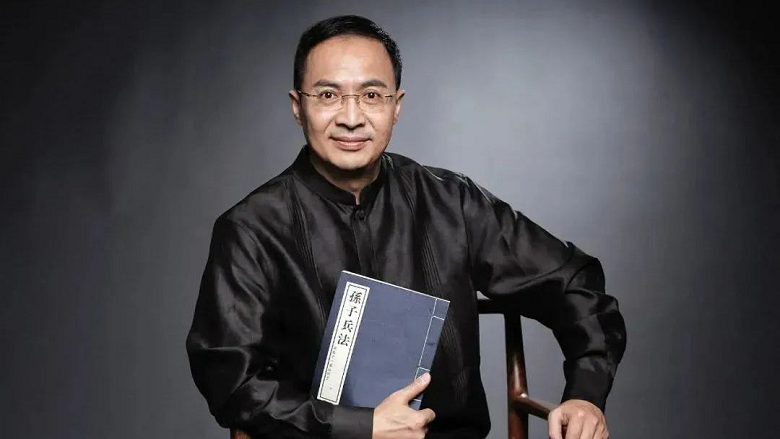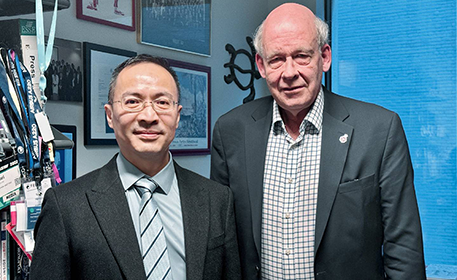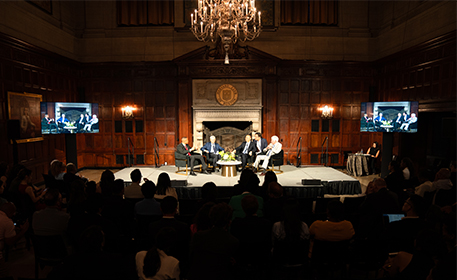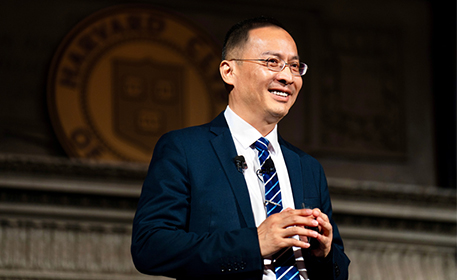
Walter Isaacson has repeatedly stated in his biography of Apple cofounder Steve Jobs that Jobs had a super-strong “reality distortion field” and he often used it to convince others to complete goals and tasks that are so far beyond reality.
When Noah Xie, President of Kmind Strategy Consulting, talks about surpassing Western strategy consulting with Chinese wisdom and seeking a new solution to Chinese corporate strategy, he seems to be generating the same reality distortion field, only he is even more oblivious to reality and obsessed with his own beliefs than Jobs.
Even with all the pressures in today’s global business world, he believes Chinese companies can initiate impactful change, but only if they use Chinese wisdom instead of Western methods.
1. They still have plenty of fight left in them.
Another once high-profile business, down.
/Another business that had seen better days collapsed.
Another brand that was once a national phenomenon, gone...
We’ve been no stranger to such misfortunates in recent years, but this year has been even worse.
The COVID-19 pandemic, especially the outbreak in Shanghai, has added to the difficulties and challenges; then there is the global economic turmoil caused by the Russo-Ukrainian War; more recently, the housing slump has taken its toll on economic reality and confidence…
Multiple pressures are forcing a growing number of once-ambitious companies and entrepreneurs to pull back, hesitate, or even give up trying. Survival has become the overriding goal, and they all speak of the future with a sense of powerlessness and helplessness.
But it was a completely different vibe in the fourth-floor conference hall of Hilton Changsha Riverside from July 21 to 23.
The place was already buzzing at 8 a.m. At 9 a.m., everyone took their seats according to name tags on the tables. The room erupted in applause, followed by three days of intense learning as the audience became students.
These students are not ordinary students.
They’ve come from all over the country, and most share a common identity: entrepreneurs.
Among them, there are industry leaders who have “violated the anti-monopoly law” with their market domination, and there are also emerging forces who are striving to break into the national market; there are old friends who have been attending for years, and those new to the workshop.
What turned them from entrepreneurs and executives into students is the “10-Billion Strategy Workshop—The Path to Large-Scale Growth” launched by Kmind Strategy Consulting. More strictly speaking, they were brought together by a common goal:
To keep the growth going and even outpace competitors in pursuit of higher growth.
Guided by that goal, the entrepreneurs, accustomed to calling the shots, put their phones in black boxes on the table and focused on the class, listening intently and taking notes.
Unlike other entrepreneurs who would sigh in despair when asked about their business, everyone in the audience was energetic and highly motivated.
Overcoming competition with breakout strategy, turning crises into opportunities, and making sudden and impactful changes were their key words.
They were bursting with ambition and determination to do something big.
The same scenario played out a month earlier at Shangri-La Xiamen with the same vigor and a much larger crowd.
In addition to notable entrepreneurs from FIRUMUS, Bosideng, Yadea, Weilong Delicious, Gongniu, Liby, Hodo, and other companies, we also saw among the attendees executives from prestigious investment firms such as IDG Capital and Harvest Capital who have themselves taught many entrepreneurs.
And instead of walking around and exchanging business cards, they sat through each session and listened attentively.
From Xiamen to Changsha in two months, 300 people came together, most of them leaders of high-profile companies who led the team and were personally involved. Some of them even traveled all the way from Xiamen to Changsha to hear the same content again for new insights.
What makes the workshop so popular? And how did Kmind manage to draw such a remarkable crowd and utter such an ambitious goal to help them overcome competition with breakout strategy?
2. A brilliant pastiche of multiple 10-billion success stories
The answer starts with two key phases: 10 billion and the path to growth.
Noah Xie, founder of Kmind Strategy Consulting and chief designer of the workshop, believes that reaching a scale of 10 billion yuan is a critical tipping point for continuous growth, and that China’s vast market has provided opportunities for all industries to achieve such a large-scale transformation.
“10-billion” companies are the mainstay of China’s economic development, playing a key role in stabilizing and promoting growth.
The market has made it possible for more 10-billion companies to emerge, and China’s economic development calls for more such companies.
Some companies have built solid foundations but failed to cross the 10-billion threshold. They are stuck in the middle: one step forward leads them to the big picture and great prospects, while a step back can cause them to slide into mediocrity and even oblivion.
Trapped in between, they desperately need to seek a breakthrough with the help of outside forces. That describes most of the entrepreneurs at the Kmind workshop.
Marketability is one of the reasons why the workshop has been highly sought after. But the real key lies in its content.
No one in China seems to have a greater say than Kmind when it comes to hitting the 10-billion revenue target, either in terms of theoretical innovation or actual results.
Since launching into corporate strategy consulting in 2015, the biggest part of Kmind’s work has been helping companies surpass 10 billion yuan in revenue.
In just five years, they have helped push five companies stuck at the billion-yuan level into the 10-billion club, generating multiple impactful and classic business cases.
Here are some examples:
They helped Yadea, which generated over 6 billion yuan in 2015, achieve annual revenue of more than 26.9 billion yuan in 2021.
FIRMUS, which had annual revenue of less than 4 billion yuan in 2016, became the first Chinese baby formula brand to hit a revenue target of 10 billion yuan in 2018 with the help of Kmind. In 2021, FIRMUS achieved annual revenue of 22.776 billion yuan and net profit of 6.915 billion yuan.
Bosideng, whose annual revenue was less than 7 billion yuan in the fiscal year 2016-17, started working with Kmind in the second half of 2017, and succeeded in surpassing 10 billion yuan within one year after the strategy was implemented (fiscal year 2018-19). In the fiscal year 2012-22, Bosideng’s annual revenue reached 16.21 billion yuan.
……
Even more impressive for the industry, consulting included, is that while maintaining high revenue growth, these companies have broken two spells that have long plagued countless Chinese companies: the inability to establish themselves at the higher end of the market and the inability to free themselves from price wars.
In other words, they have truly achieved sustainable, high-value development while taking control of their own destiny.
Kmind’s 10-Billion Strategy Workshop is a brilliant pastiche of these 10-billion success stories.
The three-day workshop is comprised of theoretical knowledge extracted from practice that points the way to large-scale transformation for entrepreneur attendees, as well as real-world case studies that re-enact key breakout methods, and is presented by none other than the people who created these cases at Kmind.
Both the teaching of theoretical knowledge and case analysis are 100 percent complete and authentic.
If you are an entrepreneur or business executive struggling to find a solution to hitting the 10 billion mark and a path to growth, would you not be interested in such a practical, effective case-based workshop? Would you not keep coming back for more insights?
3. A Chinese solution to corporate strategy
Walter Isaacson has repeatedly stated in his biography of Apple cofounder Steve Jobs that Jobs had a super-strong “reality distortion field” and he often used it to convince others to complete goals and tasks that are so far beyond reality.
When Noah Xie talks about surpassing Western strategy consulting with Chinese wisdom and seeking a new solution to Chinese corporate strategy, he seems to be generating the same reality distortion field, only he is even more oblivious to reality and obsessed with his own beliefs than Jobs.
Despite the fact that Western strategy consulting still dominates global business competition, he believes that Chinese wisdom is the more likely path to success; he even brushes aside the pressures facing businesses today, believing that Chinese companies can turn the tide and achieve greater growth.
He even argues that only Chinese wisdom is capable of initiating what he calls “sudden and impactful changes”.
Talk to Noah Xie about corporate strategy and within a minute he will be talking about Chinese wisdom, especially the unique value of Sun Tzu’s Art of War. Even if you ask a different question, he will “distort reality” and revert to the topic again.
That was all he talked about when I first met him in 2017. During my recent trip to Changsha to see if the entrepreneurs at the workshop were, as he put it, “all highly motivated and no one was complaining or moping”, he was once again raving about Chinese wisdom.
So much so that when I asked him about his biggest insight and change during the COVID-19 pandemic, his answer remained the same: he is even more adamant that Chinese companies must use strategy to guide new growth and that only with Chinese wisdom can they initiate impactful change.
Weishan was introduced into the study of corporate strategy through Western business theory. He was a “student” of such Western management and strategy gurus as Drucker, Porter, Ries, and Trout, among others, and a Chinese evangelist or translator of these theories.
Why does he “distort reality”, ignoring and eschewing Western wisdom, which himself has also studied deeply and still dominates global corporate strategy, while advocating and believing in Chinese wisdom so much?
The answer comes from Kmind’s strategic practice. It is with Chinese wisdom at its core that Kmind has been able to elevate companies from relative obscurity, forming a unique set of solutions for corporate strategy: Kmind’s strategy system follows a “war preparation-campaign” methodology that combines direct and indirect approaches aimed at winning hearts and minds.
According to Weishan, corporate strategy is essentially about winning the competition with differentiated value, and the ultimate goal of differentiated competition is to win the hearts and minds of consumers. In other words, corporate strategy must be directed at the hearts and minds of people: convincing customers to trust, choose, and even rely on you from the heart.
The success of its clients such as FIRMUS, Bosideng, and Yadea is due in large part to the differentiation strategy developed by Kmind which is based on the reality of the company and targets the minds of consumers, such as FIRMUS positioned as “more suitable for Chinese babies” and Bosideng serving as “an expert of down apparel”.
Weishan believes that no wisdom in the world understands the hearts and minds of people better than that of China, which is fully versed in the methods and tactics of the competitive game based on such understanding. “Sun Tzu’s art of war, for example, emphasizes winning hearts and minds over besieging walled cities,” he said.
Targeting the human heart and mind, Kmind divides strategy into war preparation and campaign, forming a closed-loop system, and emphasizes:
using Chinese wisdom to identify strategic and campaign opportunities and turn them into reality and strengthening preparation with Western wisdom.
In a word, it means guiding Western wisdom with Chinese wisdom.
Kmind’s strategic solution fuses the East and West with a focus on Chinese wisdom while advocating learning from the West. But when talking about Chinese wisdom, Weishan selectively omits the West, and this is where he “distorts reality”.
Human hearts and minds aside, Weishan still puts more faith in Chinese wisdom when it comes to the elements of success in strategy, preparation, and campaign.
The way he sees it, Western wisdom revolves around mathematics, logic, and standardization, excelling at finding and executing solutions in certainty, while Eastern wisdom is adept at seizing opportunities amid change and uncertainty and generating non-standardized flashes of inspiration and whimsical ideas.
Strategy, he said, lies in choice, and war preparation depends on effort. Chinese wisdom is better for making choices, while Western wisdom is better for making efforts. And now is an era where choice trumps effort. Therefore, we should use Chinese wisdom for strategy.
On the subject of war preparation and campaign, Weishan’s views can be summarized as follows: preparation is about honing skills and capabilities, much like training soldiers; the campaign is about winning a battle and getting results. But getting results is the ultimate goal, so we need strategy to guide preparation and campaign.
Drawing an analogy citing the “direct methods” and “indirect methods” from The Art of War, he argues that preparation is “direct” and standardized, to which Western wisdom is well suited, while the campaign is “indirect”, guided by certain laws but difficult to standardize, for which Chinese wisdom is a perfect fit.
In a word, it means guiding Western wisdom with Chinese wisdom.
Based on the complex and capricious hearts and minds of consumers, Kmind blends Chinese wisdom with Western wisdom, drawing on Western theories and experiences while innovating in our own; they seek methods from Chinese wisdom, learn tactics from the West, and use Chinese methods to guide Western tactics. This is the strategic solution of Kmind.
The combination of the East and West has been implemented by Kmind even in specific campaigns. For example, in February 2020, when Wuhan went into lockdown mode as COVID-19 swept across the country, Bosideng made a dramatic statement of support for China at London Fashion Week, with all the models dressed in red for the finale and four Chinese characters saying “GO CHINA!” projected onto the walls.
4. Chinese companies should have confidence.
While instilling confidence in Weishan, repeated success stories also fill him with concern: Chinese companies have arrived at a critical juncture where strategic guidance is needed, which requires confidence in Chinese wisdom.
He even made sure that I wrote this down:
“The biggest challenge for China’s corporate world is that, in a time of rapid change, Chinese companies are stuck in the same old routines. More than 90 percent of companies do not have clear strategic goals. Everyone is trying to learn the Western way of managing and running a business, but is clueless about what exactly to do? As a result, 80 percent of their efforts are misguided, ineffective, and a waste of resources.”
The West is good at telling companies what to do, but in times of rapid change, companies should look to Chinese wisdom for inspiration and strength, he said. To give more entrepreneurs a sense of direction and purpose, Kmind launched its 10-Billion Strategy Workshop as soon as the lockdown in Shanghai was lifted.
“Without a sense of direction and purpose, without the right approach and path, you will not have confidence. That’s why we need to initiate impactful change by saying out loud that growth is achievable, that we can take the initiative to create opportunities when there is none, and that we have the means and the ideas.”
In fact, the 10-Billion Strategy Workshop itself epitomizes Kmind’s strategy of overcoming adversity with Chinese wisdom to create growth.
The consulting industry, which mainly serves companies, has also been suffering during the pandemic. Shanghai-based consulting firm Kmind has been particularly hard hit. But Weishan and his team are not complaining, let alone sitting back and waiting for conditions to improve.
In the first month after the lockdown was lifted in Shanghai, the 10-Billion Strategy Workshop became a sensational hit, with attendance reaching a record high.
“I tell entrepreneurs to be confident and look for solutions, and I have to prove to them that growth can be created. But the idea came to me while I was eating in a restaurant, not by calculation, as Westerners do. This is Chinese wisdom.”
In fact, before the pandemic, when everyone was complaining about how business was tough and price wars were inevitable in an era when the focus was on existing resources, Weishan was already calling on companies to seek a Chinese path to strategic breakthroughs by creating Chinese strategic solutions with Chinese wisdom.
For Weishan, the future of the Chinese economy and Chinese companies is promising, and it’s right now.
“Pandemics, wars... We cannot change the macro-environment. We can only adapt to it. But we can improve the micro-environment around us and help make the world a better place.”
For China to transition to high-value economic development, Weishan believes Chinese companies must retool their strategies and build a new competitive edge. “The first wave of competition revolves around products, the second around brands. Brand competition in particular needs strategic support.”
He said that in the first wave of competition, China’s labor dividend made it a great success; the second wave presents a huge opportunity for brands to build a competitive advantage with Chinese wisdom, and Kmind is trying to alert more companies to this opportunity.
“We want to build a competitive strategy system for Chinese brands with Chinese wisdom. Once we unleash the competitive power of Chinese wisdom through Chinese companies, China will become a true leader in the global economy and Westerners will need to re-examine the power of Chinese wisdom in the business world.”
One thing that makes Noah Xie proud is that in 2019, among over 160 submissions sent in from over 20 countries, Kmind was awarded the Silver Constantinus Award, which is considered to be the “Oscar” of consultancy awards, upon their first submission. Beyond international recognition, Kmind’s efforts to elevate companies through strategy consulting are showing far-reaching implications.
The success of Bosideng, FIRUMUS, and Yadea, for example, has contributed to boosting progress, innovation, and upgrading across multiple industries and inspired a Chinese strategic solution to brand competition, one that is more effective than Western consulting.
Some of them are competing with foreign brands served by Western consulting firms, and some have turned to Western firms for help, which did not work out as expected, before finding Kmind, which then created marvels with Chinese solutions.
“This is a testament to the power of Chinese wisdom,” said Weishan.
And his confidence that Chinese wisdom will prevail in the future comes from a world that is increasingly awash in flux and uncertainty. “Global uncertainties are on the rise amid profound changes unseen in a century. And the greatest strength of Chinese wisdom, born out of thousands of years of change and uncertainty, is to initiate and cope with change, and to seek certainty in the midst of uncertainty.”
As Weishan said, Chinese companies have been almost universally westernized in their approach to business for years. Now is the time for Chinese wisdom to take the spotlight. “We have demonstrated that Chinese wisdom has the power to initiate impactful change. And in the world of business competition, that power is peculiar to Chinese wisdom.”






